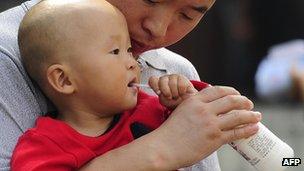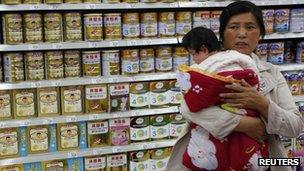China probes foreign baby milk firms for price fixing
- Published

China has faced a series of milk-related scandals over the years
China's top economic planning body has launched a probe into alleged price fixing by some foreign manufacturers of infant milk formula.
The National Development and Reform Commission said it was investigating several foreign firms for possible anti-trust violations.
The foreign manufacturers say they will co-operate with the probe.
Foreign brands are popular because tainted milk scandals in China have created a distrust of local rivals.
Foreign brands now account for about half of all infant milk sales in China, reports say.
Parents who can afford it purchase foreign brands, which cost more than their Chinese counterparts, reports the BBC's Celia Hatton from Beijing.
The companies involved - which include Nestle SA, Danone, Mead Johnson Nutrition and Abbott Laboratories - have announced plans to co-operate with the investigation.
'Poisonous powder'
China has faced a series of milk-related scandals over the years.
In 2008, six infants died of severe kidney damage and an estimated 300,000 babies suffered from kidney stones after drinking tainted baby formula.
After testing, formula from several major Chinese dairy companies was found to contain melamine, an additive that falsely boosts the protein levels in milk.
In December 2011 and July 2012, two Chinese companies recalled baby formula containing high amounts of aflatoxin, a carcinogen produced by fungus in cows' feed.
Last year, another company issued a separate recall after "unusually high" levels of mercury were found in its main line of infant milk powder.
Because of this, Chinese consumers have increasingly been looking to overseas brands, but this has led to shortages in places such as Hong Kong.
The probe has gained support from some Chinese social media users.

Demand for baby formula in China is high
One user of Sina Weibo, a Chinese version of Twitter, wrote: "They should have done this a long time ago!"
Another, Sasha Xiaolei, wrote: "Global milk products are increasing in supply, yet the price of Western milk powder in China continues to increase. Is there really insufficient supply, or distributors controlling the prices? This investigation has come a little late, but is still to the satisfaction of everyone!"
However, many also expressed scepticism of the move, and concerns about the quality of Chinese milk powder.
"Whatever the outcome of the probe, local milk will still be local milk," Sina Weibo user xinhua909 wrote.
"The investigation may struggle to convince popular opinion," lawyer Deng Zhisong wrote on his microblog.
"As a father, I know that the fault with Chinese milk powder is not that it is too expensive, but that there are fundamental problems with its safety."
"Why should they point fingers at others, when they can't even regulate their own poisonous milk powder?" another user, called Securities Trader, wrote.
- Published9 May 2013
- Published10 April 2013
- Published8 April 2013
- Published9 April 2013
- Published8 April 2013
- Published1 March 2013
- Published8 January 2013